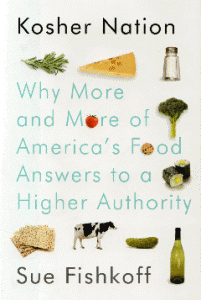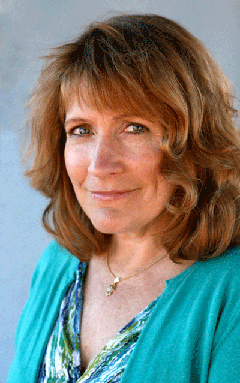Kosher food has become a $200 billion business with global reach. Who knew?
By MORDECAI SPECKTOR
American Jewish World readers often see Sue Fishkoff’s byline in the print edition of the paper. The full-time JTA correspondent reports on religious and cultural trends in American Judaism. Her new book, Kosher Nation: Why More and More of America’s Food Answers to a Higher Authority (Shocken), reports on the globalization of the kosher food industry, which continues to grow at an incredible rate, despite the fact that only a small percentage of Jews keep kosher.
On the second page of Kosher Nation, Fishkoff writes: “Today one-third to one-half of the food for sale in the typical American supermarket is kosher. That means more than $200 billion of the country’s estimated $500 billion in annual food sales is kosher certified, a remarkable statistic considering that less than 2 percent of the population is Jewish, and only a minority of them keep kosher.”
Fishkoff will talk about her adventures following kosher supervisors in their journeys, from America to China, and the varied issues raised in Kosher Nation, when she appears 11 a.m. Sunday, Feb. 27 at the St. Paul JCC, 1375 St. Paul Ave. Tickets are $6 for JCC members, $9 for the community. For information, call 651-698-0751. The event, part of the 2010 Twin Cities Jewish Book Fair, is co-sponsored by Jewish Community Action.
Fishkoff’s previous book was The Rebbe’s Army: Inside the World of Chabad-Lubavitch (which included a mention of Rabbi Moshe Feller, director of Upper Midwest Merkos – Chabad Lubavitch, coming out to the Minneapolis-St. Paul International Airport with a kosher box lunch for the author). She also has written for the New York Times and Hadassah Magazine.
In a telephone conversation with the AJW this week, Fishkoff explained who is buying all of that kosher food, and talked about the demise of Agriprocessors in Postville, Iowa, and the rise of the “new Jewish food movement.”
Around 13 million Americans buy kosher food; but only 1 million Jews keep kosher, said Fishkoff. Some Muslims and Seventh Day Adventists buy kosher products, as do vegetarians who look for the “D” symbol signifying that an item contains no meat.
Most Jewish consumers, and shoppers generally, do not notice a Circle K or Circle O hechsher (kashrut certification) on products made by Pepsi, Coca-Cola, General Mills, Nabisco, etc. But many consumers think that kosher foods are somehow cleaner and healthier than the treif (non-kosher) items.
It ain’t necessarily so, according to Fishkoff, who explains that kosher food is food that is “proper and appropriate for a Jew to eat.”
As she writes: “Kosher food is not food that is blessed by a rabbi. It is food that adheres to Jewish law. The vast body of rituals, regulations, and customs surrounding the preparation and consumption of food, collectively known as the practice of kashrut, is based on a handful of verses in the Torah… Those verses have been argued over by rabbis and scholars for more than two thousand years.”
Fishkoff mentioned that half of the all the food now exported from China to North America and Israel is kosher. She said, “It’s a case of the emperor’s new clothes”; there is no need for all of that kosher food, but food manufacturers and supermarkets are demanding it.
Toward the end of Kosher Nation, in a chapter titled “Postville,” Fishkoff reports on the demise of Agriprocessors, the Iowa slaughterhouse that became “the powerhouse of the country’s kosher meat industry, at its peak producing 60 percent of the kosher beef and 40 percent of the kosher poultry sold nationwide.”
The Postville kosher operation came to a “screeching halt,” in Fishkoff’s words, on May 12, 2008, when hundreds of ICE (Immigration and Customs Enforcement) agents raided the plant. The 389 employees taken into custody were mainly migrants from Guatemala. Agriprocessors went bankrupt, imperiling kosher meat availability across the country; and “the ethics of kashrut was a hot topic of conversation in the Jewish community and beyond.”
Following an investigative report in the Forward, on May 26, 2006, which documented health and safety violations, and the abuse of undocumented workers, a delegation from the Conservative movement, and Twin Cities-based Jewish Community Action, visited Postville. Eventually, Rabbi Morris Allen, of Beth Jacob Congregation in Mendota Heights, became a prominent exponent of an initiative to certify food on the basis of the proper treatment of animals, workers and earth — Magen Tzedek.
Fishkoff said that Magen Tzedek is “not operational yet”; and she mentioned a similar project by the Orthodox social justice group Uri L’Tzedek, which bestows its Tav HaYosher certification on restaurants that maintain certain ethical standards in their business practices.
Beyond the controversy ignited by the debacle in Postville, the “new Jewish food movement” — a term coined just five years ago, according to Fishkoff — is gaining ground in the American Jewish community. A positive aspect of the demise of Agriprocessors can be found in a revived conversation about the meaning of kashrut. Fishkoff says the question being asked, especially by young Jews, is: “What does eating like a Jew really mean?”
Groups like Hazon are promoting sustainable agriculture and environmentalism in the Jewish community, which has historically been on the leading edge of movements for social betterment. Fishkoff mentioned that shuls and Jewish schools are tending their own garden plots. It’s a sign of the times in the kosher world.
Sue Fishkoff will explain more and take your questions on Sunday at the St. Paul JCC.




















